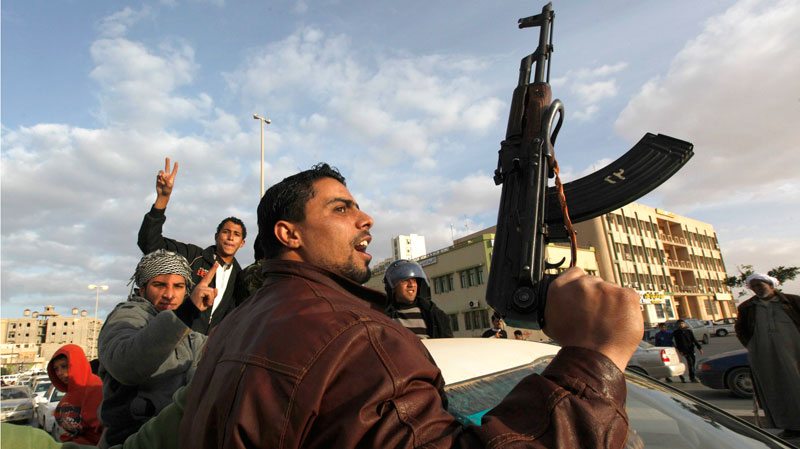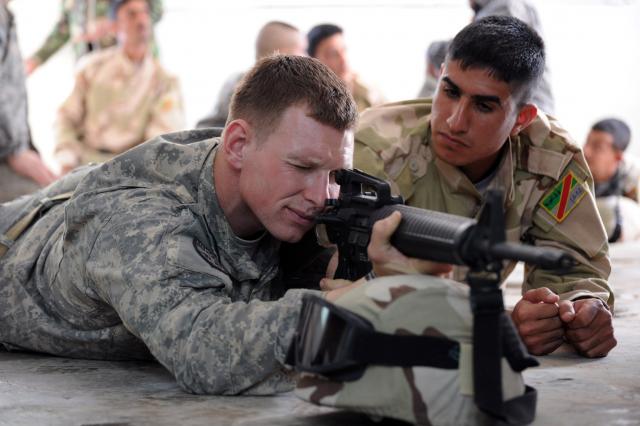Libyan rebels’ westward push to Tripoli gathered momentum on Sunday and their progress towards Sirte was given a boost as Moamer Kadhafi’s hometown was pounded by a coalition air raid.
NATO finally took full command of military operations in Libya from a US-led coalition, enabling the alliance to strike at Kadhafi forces should they threaten civilians.
That command transfer came as the capital Tripoli came under attack by what state television called “the colonial aggressor”.
The rebels’ pursuit of Kadhafi forces saw them wrest back control of key oil town Ras Lanuf and press on as far as Nofilia with the strongman’s hometown of Sirte firmly in their sights 100 kilometers (60 miles) further along the road where the next major battle was expected.
Two loud explosions were heard around 1800 GMT in Sirte as planes flew overhead, an AFP correspondent reported, while in the capital Tripoli explosions and anti-aircraft fire were reported.
Shortly after the explosions in Sirte, Libyan television confirmed the city had been the target of air raids, as had Tripoli.
Witnesses in the capital said the strikes targeted the road to the airport 10 kilometers (six miles) outside the city, as well as the Ain Zara neighborhood on its eastern outskirts.
It appeared anti-aircraft guns were not brought into action in Sirte, the next target of the rebel forces as they continue their push to Tripoli.
Earlier, AFP correspondents witnessed families fleeing west from the town following coalition air raids the previous night.
A dozen cars were seen heading towards Tripoli, 360 kilometers (225 miles) to the west, filled with women and children fearing coalition air strikes and the advancing rebel fighters, who have been pushing Kadhafi’s forces back along the main coastal road.
A Sirte resident, reached by telephone, said the town was hit by air strikes throughout Saturday night and Sunday morning. “The city became a fireball.” Most people, terrified, fled into the desert.
The rebels also promised the uprising would not further hamper oil production in areas under their control, and the opposition plans to begin exporting oil “in less than a week”, a rebel representative said.
“We are producing about 100,000 to 130,000 barrels a day, we can easily up that to about 300,000 a day,” Ali Tarhoni, the rebel representative responsible for economy, finance and oil, told a news conference.
Meanwhile, NATO took full command of military operations in Libya, but alliance officials cautioned that the transfer would take 48 to 72 hours.
Pressed by Western powers, notably the United States and Italy, to take the helm as swiftly as possible, ambassadors from the 28-nation alliance approved the transfer after overcoming French and Turkish concerns.
“Our goal is to protect civilians and civilian-populated areas under threat of attack from the Kadhafi regime,” said NATO Secretary General Anders Fogh Rasmussen.
“NATO will implement all aspects of the UN resolution. Nothing more, nothing less,” he said.
The rebels, on the verge of losing their eastern stronghold city of Benghazi before the air strikes began on March 19, on Saturday seized back Ajdabiya and Brega, 160 and 240 kilometers (100 and 150 miles) to the west.
Spurred on by the air war, the ragtag rebel band thrust another 100 kilometers past Brega to win back Ras Lanuf, routing Kadhafi loyalists.
Jubilant rebels stuck up a poster of Kadhafi after they had taken the hamlet of Bin Jawad and took potshots at it with automatic rifles as a green Libyan regime flag burned and a group of about 100 chanted: “Moamer, you’re a dog”.
“Kadhafi’s forces are now scared rats,” Mohammed Ali el-Atwish, a bearded 42-year-old fighter, told AFP.
“They are dropping their weapons and uniforms and dressing as civilians. We are no longer concerned about Kadhafi’s forces at all.”
The rebel fighters marked the takeover of Ras Lanuf with celebratory gunfire and fired a rocket-propelled grenade in a sign of victory.
One of them, Attia Hamad, 34, said insurgents were in full control of the town.
“All of it is in our hands,” Hamad said of Ras Lanuf, which Kadhafi forces had overrun on March 12. Loyalists were “retreating so quickly, they are leaving some fighters behind.”
Foreign ministers from more than 35 countries have so far confirmed they will attend a London conference Tuesday to discuss coalition military action against Libya, Britain said.
Many Libyan diplomats and military leaders are defecting, US Secretary of State Hillary Clinton said on the eighth day of the coalition operation.
“We have a lot of diplomats and military leaders in Libya who are flipping, changing sides, defecting,” Clinton told CBS television.
Defence Secretary Robert Gates said intervention in Libya was not vital to US interests, but explained: “You had a potentially significantly destabilizing event taking place in Libya that put at risk potentially the revolutions in both Tunisia and Egypt.”
He added: “Egypt is central to the future of the Middle East.”
Elsewhere, Gates reiterated that regime change was not part of the military mission in Libya.
“As we’ve seen in the past, regime change is a very complicated business, sometimes it takes a long time, sometimes it can happen very fast. But it was never part of the military mission” in Libya, he told ABC television.
In Tripoli, government spokesman Mussa Ibrahim said overnight that the Western-led air strikes were killing soldiers and civilians between the strategic town of Ajdabiya and Sirte.
“We are losing many lives, military and civilians,” Ibrahim added, while renewing a call for a ceasefire and an urgent meeting of the UN Security Council, which approved military action to stop the regime’s attacks on civilians.











